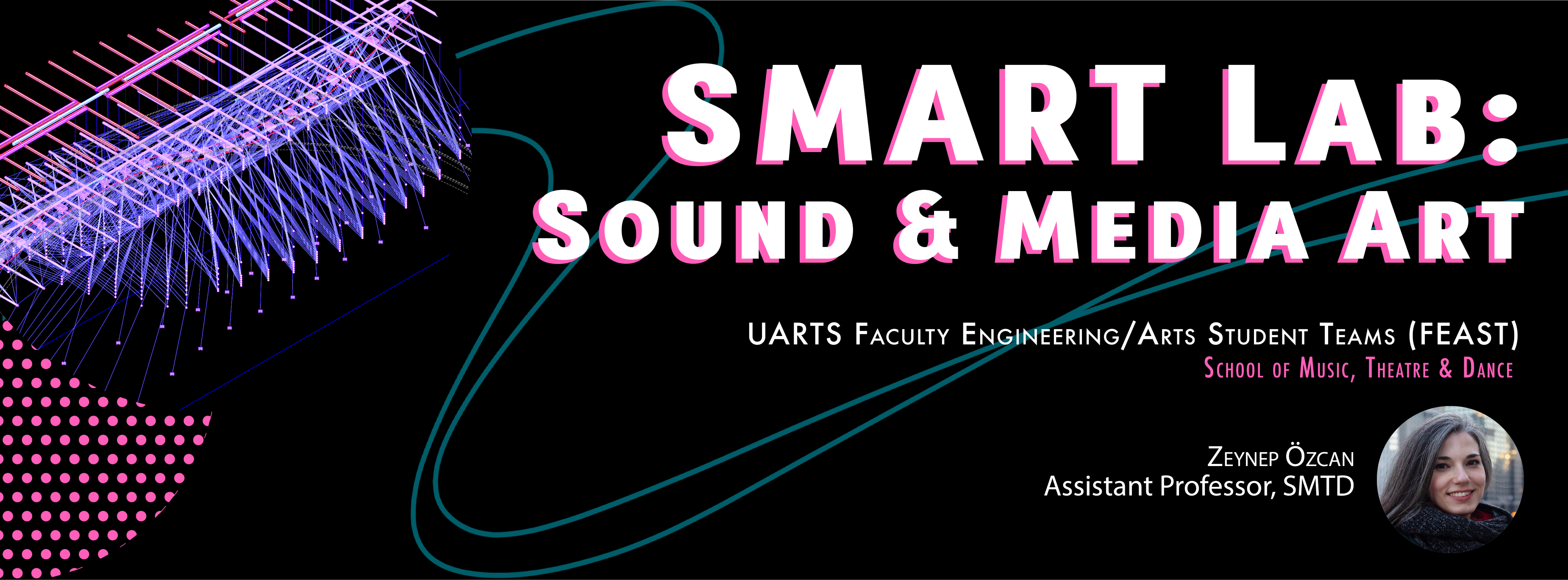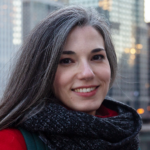<< Back to Project List

Students involved in the Lab will be able to engage in a collaborative and interdisciplinary environment, working in biology, sound design, programming, interaction design, data sonification, architecture, video, and creative technologies. Students will gain hands-on experience in conceptualizing, designing, and implementing immersive and interactive media art installations.
SMART Lab’s current project, ZAP, is an interactive multimedia installation inspired by the electric eel’s Electric Organ Discharges (EODs). This project studies organisms and their adaptive behaviors, using the findings to develop sound installations and experiment with various materials, sensors, and technologies to craft wearable interfaces that allow participants to manipulate sound.
SMART Lab’s next project will explore cyberfeminis art. Graduate students who are interested in multidisciplinary artistic research and seeking opportunities to contribute to research papers and presentations at conferences are especially encouraged to apply.
Requirements: Preparation needed before the Lab team meets in the Winter 2025 semester. Introductory-level familiarity with cyborg theory and feminist cyborg theory is required. Readings will be provided before the WN 2025 semester begins.
Core Concepts:
Cyberfeminism: The project will engage with cyberfeminist theories, exploring how technology can be used to challenge gender norms and create alternative representations of femininity.
Playfulness: We will incorporate playful elements, such as interactive games, physical engagement, and unexpected sensory experiences, to encourage audience participation and critical thinking.
Illusion: The installation will utilize illusions and misdirection to create a sense of wonder and to challenge perceptions of reality and identity.
Expected Outcomes
Interactive Installation: A media art installation blending sound, visual and generative art, and interactivity.
Research Contributions: Development of research papers and presentations that integrate cyberfeminist with interactive media arts.
Community Engagement: Engage the university community and the broader public to promote aa greater understanding and appreciation of cyberfeminist art and interactive media.
Artist (1 Student)
Responsibilities: Design and build large-scale 3D structures and sculptures that form the physical backbone of the installation.
Likely Majors/Minors: ARCH, ARTDES, FTVM
Coder: (1 Student)
Preferred Skills: Proficiency in programming languages commonly used in coding.
Interest in creative coding, generative art, rule-based systems, audiovisual systems and world making. Experimental and innovative student to develop a generative art project that critically engages with the concept of duality through a cyberfeminist lens. Critical thinking about how to challenge hierarchical structures in code.
Question to think for the application: How Boolean logic can be used to represent traditional binary oppositions (e.g., male/female, good/evil)?
Likely Majors/Minors: CE, CS, EECS, PAT, SI
Digital Artist and Visualization (2 Students)
Preferred Skills: Strong foundation in visual arts and digital media, proficiency in design software, ability to translate conceptual ideas into visually compelling and interactive digital content and interest in creating immersive visual experiences. Experience with generative art, animation, and video production is a plus.
Likely Majors/Minors: ARTDES, EECS, CE, CS, FTVM, PAT, SI
Fabrication and Physical Computing (1 Student)
Preferred Skills: Ability to integrate Arduino boards with other hardware and software components for data acquisition and control. Knowledge of electrical circuits, wearables, circuit design, and the ability to prototype and create custom electronic circuits. Understanding of sensors and electronic components commonly used in interactive installations. Interest in maker culture.
Likely Majors/Minors: ARTDES, ARCH, EE, EECS, FTVM, ME, PAT, ROB
Installation Architect and Sculpture (1 Student)
Preferred Skills: Multidisciplinary approach to building three-dimensional immersive and interactive environments that aligns with the project’s objective. Knowledge of structural engineering and construction methods to ensure the feasibility and stability of the installation. Openness to experimentation and to explore new ideas and technologies to enhance the immersive and multi-sensory experiences. Interest in performative architecture, designing responsive sculptural objects, creating large-scale sculptures and installations.
Likely Majors/Minors: ARTDES, ARCH, FTVM
Faculty Project Lead

Dr. Zeynep Özcan is an experimental and electronic music composer, sound artist and performer. She holds a Ph.D. in Music from Istanbul Technical University, an M.A. in History of Architecture, and a B.A. in Philosophy from Middle East Technical University. She explores biologically inspired musical creativity, interactive and immersive environments, and generative systems.
Her works have been performed and presented throughout the world in concerts, exhibitions, and conferences, such as AES, ICAD, ICMC, ISEA, NIME, NYCEMF, WAC and ZKM. s She is an Assistant Professor and a faculty director of Girls in Music and Technology (GiMaT), Summer Institute at the Department of Performing Arts Technology at the University of Michigan, School of Music, Theatre & Dance. She specializes in the implementation of software systems for music-making, audio programming, sonification, sensors and microcontrollers, novel interfaces for musical expression, and large-scale interactive installations. Her research interests are exploring bio-inspired creativity, artistic sonification, playfulness and failure in performance, and sonic cyberfeminisms.
She is passionate about community building and creating multicultural and collaborative learning experiences for students through technology-driven creativity.
Likely Majors/Minors: ARCH, ARTDES, CE, CS, EE, EECS, FTVM, ME, PAT, ROB, SI
Meeting Details: TBD
Application: Consider including a link to your portfolio or other websites in the personal statement portion of your application to share work you would like considered as part of your submission.
Summer Opportunity: Summer research fellowships may be available for qualifying students.
Citizenship Requirements: This project is open to all students on campus.
IP/NDA: Students who successfully match to this project team will be required to sign an Intellectual Property (IP) Agreement prior to participation.
Course Substitutions: CoE Honors
